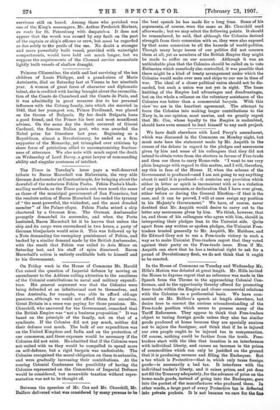On Friday week in the House of Commons Mr. Harold
Cox raised the question of Imperial defence by moving an amendment to the Address calling attention to the smallness of. the Colonial contributions to naval and military expendi- ture. His general argument was that the Colonies were being defended at an infinitesimal cost to themselves, and thus Australia, for example, was able to afford old-age pensions, although we could not afford them for ourselves. Great Britain in a sense was paying for those pensions. Mr. Churchill, who answered for the Government, remarked that the British Empire was "not a business proposition." It was based on the principle of the family, not on that of a syndicate. If the Colonies did not pay much, neither did their defence cost much. The bulk of our expenditure was on the United Kingdom and India and on the protection of our commerce, and these expenses would be necessary if the Colonies did not exist. He admitted that if the Colonies were not united with us they would be compelled to spend more on self-defence, but a rigid bargain was undesirable. The Colonies recognised the moral obligation on them to subscribe, and were gradually increasing their contributions. At the coming Colonial Conference the possibility of having the Colonies represented on the Committee of Imperial Defence would be considered, but meanwhile taxation without repre- sentation was not to be thought of.










































 Previous page
Previous page